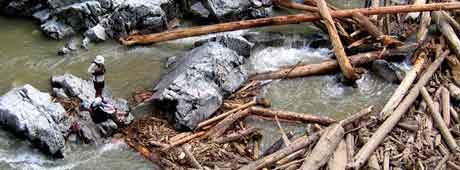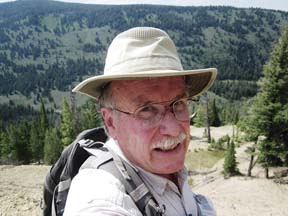No products in the cart.
Log-Jammed

Stranded on the Middle Fork, a Rafting Party “Self-Rescues”
By Ray Brooks
“There‘s not supposed to be a lake here!” I exclaimed.
It was midday, July 24, 2006, mile twenty on our eight-day, hundred-mile Middle Fork Salmon float trip. As we rowed farther down this large new lake, we could see other rafts ahead on its western bank. Bequi Martel, our kayaker, sprinted ahead and returned with the news: the lake had been caused by a “blowout” the previous night, and there was also a huge logjam downriver one-half mile, in Pistol Creek Rapid.
We rowed over to a group of rafts on shore, nudged our way in, landed, and tied off. Then we talked to other rafters who already had scouted out the situation. A thunderstorm the night before had dropped nearly an inch of rain on fragile soils that had never recovered from a huge fire six years earlier. Then Lake Creek, a small side-stream, blew out into the Middle Fork. The blowout was essentially a large mudslide that also took hundreds of large Ponderosa pines down into the Middle Fork Salmon. The blowout completely dammed the Middle Fork for a while, forcing the river out of its channel into trees on its west bank. Sometime in the night, the blowout dam partly broke and a huge mass of trees was washed downstream a half-mile.
Pistol Creek Rapid, which usually reminds me of a short roller-coaster ride, is Class III-plus whitewater. Now its narrow channel between granite cliffs was clogged with over a hundred large logs, some as long as eighty feet. The rapid was totally un-runable and everyone upstream of it was stranded until the logjam could be removed. With plenty of time on our hands, the seven of us in our group walked downstream to inspect the logjam. Strolling along a good trail on the west side of the river, we gaped at the spectacle. The river below the blowout was totally different than I remembered from my last trip down the Middle Fork in 2000. It now looked like an Alaskan river with braided gravel bars, milky white water, and clumps of logs left by the flood. We were able to walk out on the cliff right above the logjam at Pistol Creek Rapid, and it was easy to see that any boat trying to get by the logjam would be instantly sucked under it.
After walking back upriver from inspecting the logjam, we pitched our tents on a flat bench close to our rafts, just above the lake. This area, which became known as the “refugee camp,” already held six parties, including three large outfitter groups. We worried that even more upstream rafters would soon arrive and over-crowd our campsite.
This content is available for purchase. Please select from available options.
Purchase Only
Purchase Only


Comments are closed.